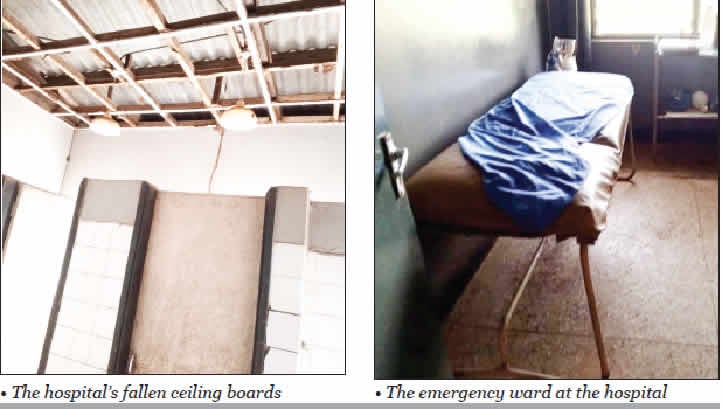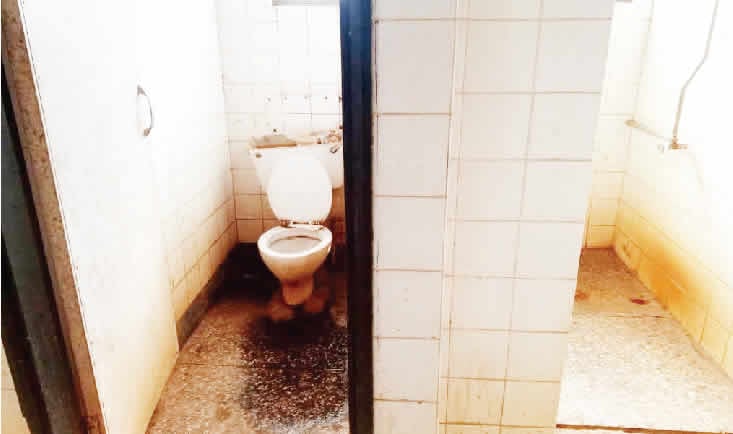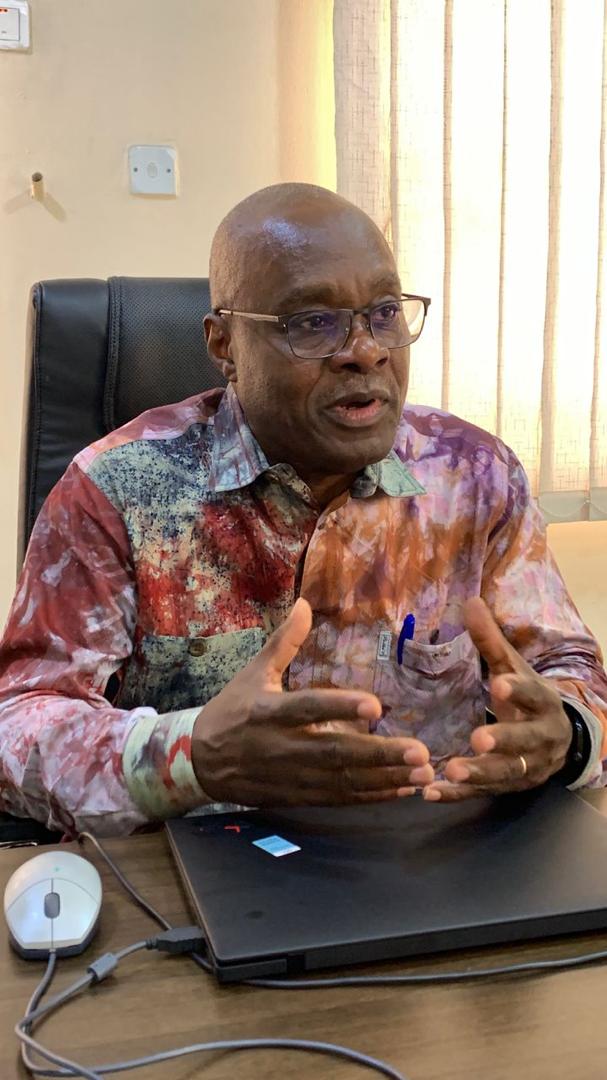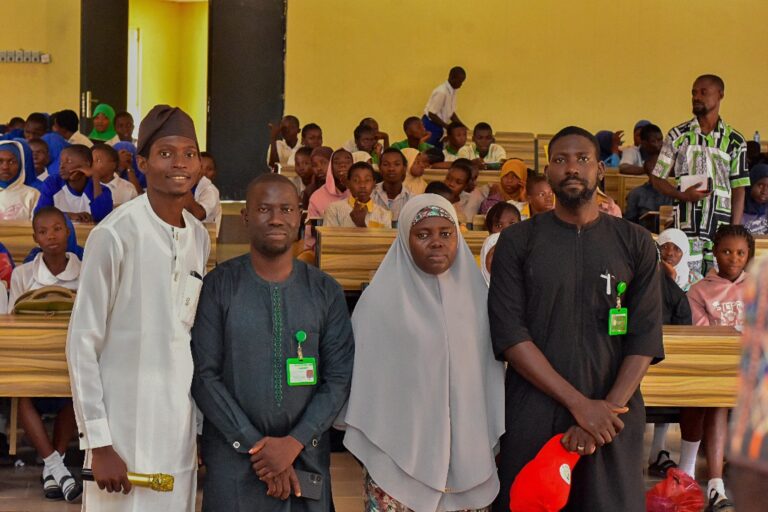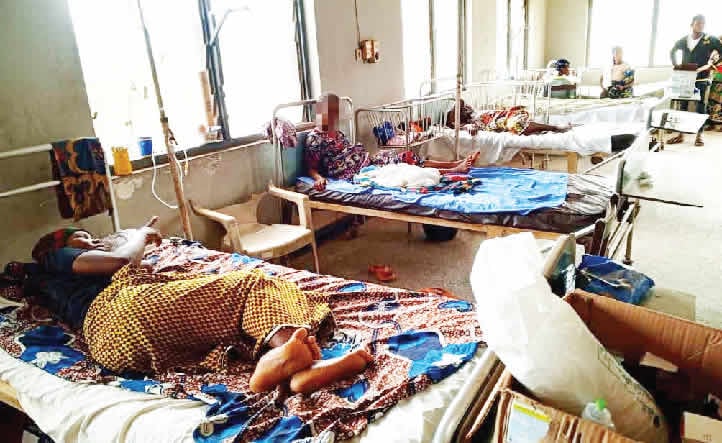
At the General Hospital in Ipokia, Ogun State, patients seeking care are greeted not by the promise of healing, but by leaking roofs, cracked walls, broken beds, and outdated equipment. Once a proud community facility, the hospital has deteriorated into a place where the sick are admitted with their own mattresses, forced to navigate dilapidated wards in search of relief.
Opened on January 30, 1970, by the then Military Governor of the Western Region, Robert Adeyinka Adebayo, the hospital has hardly undergone any major refurbishment in its 55 years of existence. Today, aside from stained and cracked walls, almost every structure and amenity that once defined the hospital’s value has fallen apart.
From the gate, the neglect is glaring. The gatehouse, garages, reception, lodges, and adjoining offices are shadows of their original form, far from befitting a secondary health facility. The wards, labour room, restrooms, and offices have decayed to the point where routine cleaning no longer makes a difference.
The terrazzo floors, once elegant and polished, now bear scars of neglect. The once sparkling marble chips are now dulled by years of grime and foot traffic. Health attendants and cleaners have long run out of ideas about how to make the environment even remotely welcoming.
A recent visit by our correspondent to the agrarian community hospital revealed the full extent of the decay. The wards are lined with ceilings that are steadily collapsing, with fallen plaster and paint chips scattered across the floors. Patients and visitors move through the corridors anxiously, eyes intact on the sagging ceiling boards, never sure when the next piece will fall.
The medical equipment that once gave the hospital pride has long gone, reportedly carted away to Abeokuta for reasons residents say remain unexplained. What remains is a shell of a facility.
On rainy days, patients and their caregivers no longer just contend with illness—they fight for dry corners in a building that barely resembles a hospital. The roof, riddled with holes, serves more as a sieve than a shelter, letting rainwater stream freely into wards and offices.
The bathrooms present an even grimmer picture. Dirt and grime cling stubbornly to every surface. Toilets are clogged, cisterns broken, and pipes rusted. The foul smell lingers in the air, while cracked seats and leaking faucets complete the picture of abandonment. In one instance, a patient reportedly had to leave the hospital to relieve himself at home before returning to his hospital bed—a reflection of the deplorable state of the restrooms. Sticky, slippery floors, foul odours, and failing infrastructure combine to make the bathrooms a potential breeding ground for infection. Here, neglect is not just visible; it is dangerous.
The restrooms
Once a source of pride for the people of Ipokia, the General Hospital today is a crumbling relic. Its worn-out infrastructure has left residents struggling to access healthcare safely, underscoring years of government neglect and a desperate need for urgent intervention.
When our correspondent visited the hospital, the female ward was empty. The male ward had one patient, and the maternity ward had four neonates and their mothers. Residents of Ipokia said this showed the level at which the hospital has lost its glory and is now deserted by people who seek healthcare elsewhere, accredited or not.
“That hospital used to be our pride, but not anymore. It is now like an abandoned zone. People now seek healthcare somewhere else. Instead of going to that kind of hospital, they would rather go to a private one, some of which are not registered. The so-called auxiliary nurses are now the ones people rely on for their healthcare. Many have even resorted to self-medication, and you know what that means. Go and look at the empty wards; look around. It’s so degrading,” a community leader told our correspondent.
It was learnt that the beds in the wards have deteriorated to the level that some patients on admission now bring their own beds to the hospital.
“Look at the beds; see the springs and the stands. They are no longer good. That is why some patients go there with their beds. They know the condition of the beds in this hospital, and they know they can’t sleep on them. If you look at those beds, you will see they are gone. The metal frame and the mattresses – none of it is worth writing home about. The one in the emergency ward is even worse. Let’s just pray a patient doesn’t fall off one day,” a resident, Bolaji Sadiku, told our correspondent.
Empty theatre
The operating room at the hospital became empty after all the equipment installed in 1970 fell apart. As of today, our correspondent learnt that the theatre is still functioning because a community leader, the Balogun of Ipokia, Adesola Abolurin, renovated it. To prevent maternal mortality during Caesarean sections, Abolurin procured modern tools, including an operating table, suction machine, lights, and air conditioners. To keep the hospital from darkness, he also installed solar power. With this effort, the overworked doctor and nurses do their best to attend to pregnant women with special cases.
No hope for preterm babies
Children born before their due dates have no hope of survival in Ipokia. Unfortunately, there is no nearby facility where such neonates could be referred to. As a result, there have been cases of infant mortality involving preterm babies. When there are preterm births, depending on how critical the condition is, the babies are usually referred to the Federal Medical Centre in Abeokuta. Sadly, most of the babies die on the four-hour journey.
Alhaji Sodeeq Akeem was among the few lucky ones whose set of twins survived the condition last year. His two girls were born underweight, but a serving medical corps member in the hospital at the time volunteered to give them the intensive care they deserved, even without an incubator. Akeem was lucky because the conditions of the babies could be handled without the dire need for an incubator.
“When we gave birth to my twins, they were small and needed special care. They were supposed to be in the incubator for some weeks, but this hospital didn’t have that facility. They planned to refer us to Abeokuta that time, but there was no ambulance facility for that. There was a female doctor here then, a youth corps member, Dr Ramon. She was the one who faced the challenge. She did everything to ensure my daughters survived. I was lucky, all thanks to Allah. Others may not be so lucky,” the businessman said.
However, Adelani, another resident, was not so lucky. Earlier this year, his wife was delivered of a baby at the seventh month of pregnancy. The baby was underweight and had to be referred to the medical facility in Abeokuta.
“We lost the baby before we got to Ilaro. It was so painful. This hospital was built with a neonatal intensive care unit. It used to have an incubator, but I learnt that machine was taken away. With what we have seen, the few workers here have the capacity to handle preterm babies, but there are no facilities. We need urgent government attention,” he said.
Ambulances without drivers
Unarguably, the Ipokia General Hospital may be the only one with two ambulances parked under a shed because there are no personnel to drive them. The hospital has had one ambulance for years, and another was recently donated by the senator representing Ogun West, Olamilekan Adeola. Our correspondent saw that the vehicles were parked at the entrance, but there are no drivers to make good use of them.
“There are no drivers to operate these ambulances. It is so bad that the government cannot give us a driver for these ambulances. If there is a need to rush anybody to Abeokuta or Ilaro, these ambulances would just be useless. The last time my relative was moved to Abeokuta, we had to hire a driver from Idiroko. Look at that! How can we go to Idiroko to hire a driver for an ambulance in Ipokia? What if the man is busy? It doesn’t make sense,” the resident said.
Equipment moved away
The PUNCH gathered that officials of the Ogun State Hospital Management Board, sometime last year, arrived at the hospital with a truck. Their mission, initially unknown to many, was to cart away some medical equipment from the hospital. The only defence was that there were no trained personnel to operate those machines.
“From our findings, when they came last year or so, they took inventory of everything here with the storekeeper, who provided them with the list. There was even a big generator that had the capacity to power both the hospital and the water corporation machine beside it. Everything was taken away to Abeokuta. We were told that there were no personnel to handle those machines. So, they were taken away, even some that were installed decades ago. Instead of training people or sending trained personnel to Ipokia to handle the equipment, they took them away. I don’t think it is good,” a community source, who did not want to be mentioned, said.
Overworked staff
As of today, the general hospital is understaffed. Workers cannot go on leave while some run double shifts day and night with not enough time to rest. It was gathered that some nurses and doctors posted to Ipokia refused to stay because of the condition of the facility. Currently, there is only one doctor, who is usually assisted by a corps member.
“When nurses and doctors are posted here, they seek redeployment immediately. We have only one doctor, assisted by an NYSC doctor. One of our fathers here volunteered to take care of the corps members, paying them an additional stipend every month. He even got a power generator for them so they can stay. That is Ambassador Abolurin. The government should upgrade this hospital,” the Chairman, Ipokia Youth Development Council, Idowu Ajibade, said.
Ajibade regretted that the community had written several letters but there was no positive response from the government.
“Several letters have been written, but there has not been any positive response from the government. Can we compare this general hospital to the ones in Ota, Abeokuta, Ilaro, Ijebu-Ode, or even the one in Idiroko? How can just one doctor handle all cases? Are there not supposed to be specialists? How omnipotent is a doctor that he could handle all situations? Someone spoke of low patronage. Why won’t there be low patronage when the hospital is now a den of rats? This healthcare facility used to be our pride. It is the only general hospital in the whole Ipokia district, serving about eight wards. People started deserting it when it started becoming empty.
“As for the machines they said were moved away, we don’t know the reason for that, but they may feel it was better to take those things to where they would be useful instead of abandoning them here. But I believe that is not the best thing for the good people of Ipokia. The people deserve quality healthcare. We need to save this hospital from deterioration,” the youth leader remarked.
Group kicks
The sad reality drew the concern of The Pacesetters of Ipokia, a pro-development group in the area. In a strongly worded statement signed by its president, Kehinde Olumilade, the group painted a disturbing picture of the hospital’s decline.
“The Pacesetters of Ipokia note with deep concern the deplorable state of the General Hospital in Ipokia, once a beacon of hope and pride for our people. Today, the facility that should serve as the primary centre for healthcare delivery in the local government has been reduced to a shadow of itself,” the statement began.
The group recalled how the medical equipment that once adorned the hospital and gave confidence to patients has disappeared. Many residents, they said, alleged that the equipment was moved to Abeokuta for reasons still unexplained. What is left behind, according to The Pacesetters, is “a structure in decay, leaving patients and carers to struggle in unsafe and humiliating conditions.”
“Whenever it rains, wards and offices become flooded, as the leaking roof offers no protection. Patients, who should be receiving treatment in dignity, are forced to scramble for dry corners with their caregivers. In such an environment, quality healthcare is not just difficult—it is impossible,” the group lamented.
The statement was unequivocal in its demand: the Ogun State Government must act. “This is unacceptable. The people of Ipokia deserve better. We therefore passionately appeal to the Ogun State Government, under the leadership of His Excellency, Prince Dapo Abiodun, to urgently intervene by renovating the hospital, re-equipping it with modern medical facilities, and restoring it to the standard befitting a general hospital. The government should explain to us why some equipment was moved from this hospital with no replacement. The people deserve some explanations,” the group stressed.
Reiterating that the health of the people is non-negotiable, Olumilade stressed that a functional healthcare facility is not a privilege but a right.
“The health of our people cannot wait. A functional healthcare facility is not a privilege—it is a right. We believe that with the prompt attention of the state government, Ipokia General Hospital can once again serve as the lifeline for thousands of families who depend on it daily. We urge the government to act now, in the interest of public health, equity, and justice.”
With voices like those of The Pacesetters of Ipokia amplifying the cries of residents, the once-glorified hospital’s fate now rests squarely on the state government’s response—or silence.
Monarch’s unsuccessful efforts
The Onipokia of Ipokia, Oba Yisa Olaniran, said he and other elders of the community have made repeated efforts to salvage the situation. The monarch seemed tired, but he refused to give up because the hospital may cease to exist if the current trend continues.
The traditional ruler, just like Ajibade, said letters were written to the Commissioner for Health, Tomi Coker. Promises were made, and officials of the government were sent to take photos of the hospital. But weeks and months passed with no remedy in sight.
“We have written several letters to the State Commissioner for Health as regards the general hospital in the past, in which they promised heaven and earth. They even sent their officials to take pictures then, all to no avail. You can even ask the lead physician there, Dr Sule; he was part of it then. No medical staff, just one doctor and an NYSC doctor. No equipment, and part of the building has become dilapidated. We pray the government remembers us one day,” he pleaded.
The Balogun of Ipokia, who has been supporting the facility, regretted that it is still in bad shape despite all efforts to make it look a bit better.
“The hospital remains in bad shape. I am in constant touch with the Permanent Secretary of the Hospitals Management Board. I hope to see the Chief of Staff on the re-roofing of the hospital,” Abolurin stated.
Ogun govt mum
The Ogun State Government has refused to speak on the hospital despite repeated efforts to get government officials to react.
A government spokesperson, Kayode Akinmade, said he would not be able to speak about the matter, referring our correspondent to the health commissioner.
The commissioner, Coker, did not answer calls to her phone nor did she reply to text messages sent to her days before filing this report.
In all of this, it could be deduced that Ipokia General Hospital tells a sobering story of how neglect can strip a once-proud institution of its value. What should be a place of healing has become a source of worry, where patients contend not just with illness but with broken beds, leaking roofs, and equipment long carted away. For a community that has written letters, pleaded with government officials, and even relied on the goodwill of individuals to keep the hospital barely functional, the silence from the authorities is deafening. The people of Ipokia are not asking for luxury; they are asking for the basics of care and dignity. Until that comes, the hospital will remain a shadow of itself, and the residents will continue to pay with their lives.
SOURCE: PUNCH Newspaper
